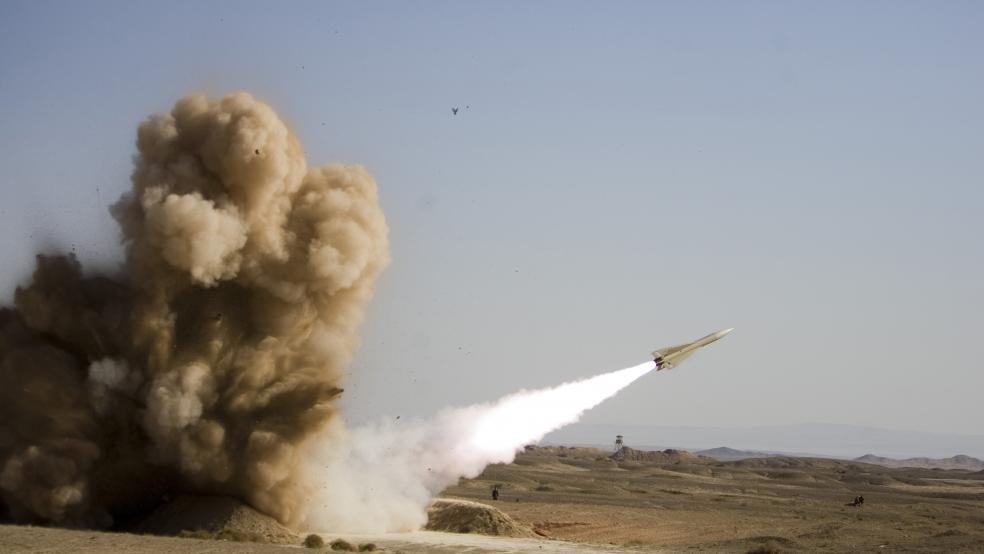President Trump said all along he was going to go after the Iran nuclear pact—another of his “worst evers.” During his campaign, he promised more sanctions, a promise which he has now kept after Iran fired a ballistic missile test last month and then on Tuesday, fired a short-range surface-to-air missile from the same launch pad.
It’s fast work for Trump and Michael Flynn, who holds the Iran portfolio. “As of today, we are officially putting Iran on notice,” Trump’s national security adviser said just days after the missile was launched.
Related: Iran Vows 'Roaring Missiles' If Threatened, Defies New Sanctions
Next, comes Trump’s demand to renegotiate the Iran nuclear agreement, which was signed by the five permanent members of the United Nations Security Council—the US, United Kingdom, Russia, France, and China, plus Germany. Trump’s planned actions carry big risks; are they worth taking?
Sanctions. Treasury announced the new sanctions February 3, a few days after another of the ballistic missile tests Iran periodically conducts. They cover 12 companies and 13 people—some Iranian and some foreign, including one Chinese business executive. All are alleged to support, one way or another, Iran’s missile program or its Revolutionary Guards.
It’s a proven loser. The Obama administration failed repeatedly to include the missile tests as a violation of the nuclear deal. When that didn’t stick, Samantha Power, Obama’s U.N. ambassador, asserted that the tests breach an earlier Security Council resolution.
They do not in either case. The Trump White House is down to claiming the tests “violate the spirit” of the pact, but they don’t do that, either. As to the 2015 U.N. resolution, it covers missiles bearing nuclear warheads, and Iran’s could, but don’t. Bottom line: Washington’s sanctions will never deter the Iranians from providing for their own defense.
Related: Iran Confirms Missile Test, Drawing Tough Response from Trump Aide
The nuclear accord. It’s hard to negotiate when there’s no one across the table, and Tehran made it clear even before Trump’s inauguration that it has no intention of revisiting the terms of this agreement. Just as saliently, Trump and Flynn won’t have anyone on their side of the table, either. The P5 + 1 group is not even remotely considering a renegotiation.
Speaking in Tehran after the test last week, French foreign minister Jean–Marc Ayrault expressed “concern” about it, which is just above a shrug in diplomacy-speak. He then said, “We harbor real concerns about the U.S. administration’s attitude toward this agreement.”
Trump and Flynn need a reality check before they go any further. Their running theme, “Iran should be grateful for the nuclear agreement,” is myopic and needlessly provocative. As Ayrault and others now signal, Trump and Flynn are taking some big gambles, even if they don’t yet realize it. And there’s nothing to gain and a lot to lose—which is a good definition of an unwise wager.
Does Washington truly want to alienate the reformists in Tehran who pushed the agreement through at considerable political cost? Were things better under the egregious Ahmadinejad regime? What about the Europeans who are weary of the sanctions regime and the post-pact hostility between Washington and Tehran? Can Trump afford to annoy the Continent more than he already has?
Related: Mattis Says U.S. Not Adding Troops Over Iran Concerns
Since his telephone conversation with Vladimir Putin a couple of weeks ago, it’s clear that Trump is committed to his neo-détente policy toward Russia. Given Russia’s notable efforts to get the nuclear deal done, Trump should see the risk of shooting himself in the foot if he pushes too far on Iran.
On the GDP side, what’s going to happen to Boeing’s $16.6 billion deal, signed in December, to sell Iran Air 80 planes?
Here’s the irony: While a redone deal is an obvious reversal of Obama’s policy, Trump and Flynn otherwise assume a variation of the policy the Obama administration handed them. This means they’re headed for the same kind of trouble Obama found and some new trouble of their own making.
The sanctions just implemented were drafted while Obama was still in office. As to the nuclear accord, Obama’s Treasury began to undermine it as soon as it was signed. If an administration wanted to reap as little benefit as it could from a deal it worked hard to strike, Barack Obama and John Kerry, his secretary of state, showed how to do it.
Trump and his national security adviser should avoid making a variant of the same mistake.
No diplomatic settlement is ever perfect, but the Iran accord has plenty in it to Washington’s advantage. Iran accepted a significant infringement on its sovereign rights including inspections of unprecedented intrusion. And the Iranians are sticking to the terms, although the reformists who negotiated are now stuck in a battle they shouldn’t have to wage.






